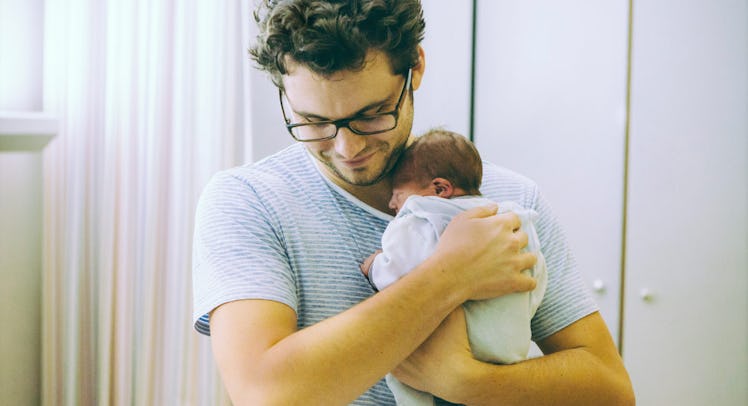Your Recent Sexual Partners May Shape Your Desire To Be A Dad
The urge to become a father may be less about who you are — and more about who you're with.

A man’s interest in becoming a father may have less to do with his sexual orientation than it does with the gender of his most recent sexual partner, according to a new study in the Journal of Family Psychology. While the researchers confirmed that heterosexual couples were more likely than homosexual couples to express a desire to become parents, those metrics didn’t hold when more fluid members of the LGBT spectrum weighed in. Bisexuals and men who have sex with men but recently dated women, for instance, typically expressed strong desires to become parents.
The authors concluded that men with access to willing wombs may be just as likely as heterosexual men to say they want kids, regardless of their sexual orientations. “I think part of what’s going on is that the routes to parenthood when you have a womb and eggs available to you are logistically simpler and often more affordable than when you don’t,” coauthor Rachel G. Riskind, assistant professor of psychology at Guilford College, told Fatherly.
Riskind says she embarked on the study to better understand how shifting cultural attitudes on the subject of gay parenting may impact the way LGBT people think about fatherhood and motherhood—especially in light of recent scientific advances that have enabled same-sex couples to become parents via surrogacy. “So much of the path to parenthood is really focused on conceiving a child the conventional way, through penile-vaginal intercourse,” Riskind says. “We know that there are lots of other pathways available now, although there are some barriers to entry for many of them as well.”
For the study, Riskind and colleagues examined data collected by the Centers for Disease Control and Prevention via the National Survey of Family Growth. They focused on a large sample of nearly 4,000 childless adults with diverse sexual orientations who responded to questions regarding their desires and intentions to become parents. They found that, despite shifting cultural views, gay men and women still reported less desire for parenthood than their heterosexual peers. They then zeroed in on the bisexual population, and found that their aspirations for parenthood were more closely aligned with the desires of their heterosexual peers than their homosexual peers.
But their most surprising finding was that, regardless of sexual orientation, people whose most recent sexual partners were of the same gender were less likely to report desires and intentions for parenthood than those whose most recent partners were of the opposite gender. Riskind suspects this lack of enthusiasm is partly due to the physical, legal, and monetary barriers that can make the goal of parenthood seemingly unattainable for same-sex couples. “We know that these barriers are much higher when you don’t have the option of becoming pregnant yourself,” Riskind says.
Regardless, Riskind concludes, the urge to become a father may be less about who you are — and more about who you’re with.
This article was originally published on